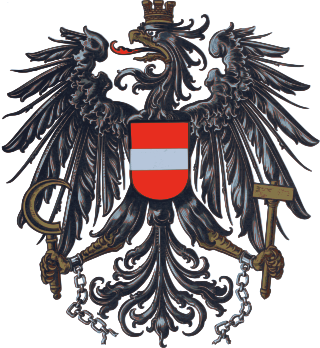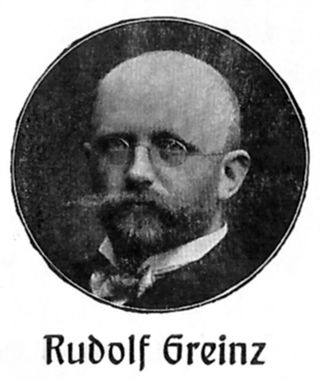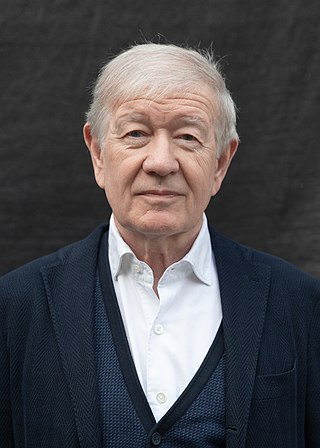Related Research Articles

The current coat of arms of the Republic of Austria has been in use in its first forms by the First Republic of Austria since 1919. Between 1934 and the German annexation in 1938, the Federal State used a different coat of arms, which consisted of a double-headed eagle.

Eduard von Martens also known as Carl or Karl Eduard von Martens, was a German zoologist.

Elisabeth Ludovika of Bavaria was queen of Prussia as the wife of King Frederick William IV. By birth, she was a Bavarian princess from the House of Wittelsbach; she was related to the ruling houses of Austria and Saxony through the marriages of her sisters. She supported her husband's interests in art and made charitable donations.

Mörsbach is an Ortsgemeinde – a community belonging to a Verbandsgemeinde – in the Westerwaldkreis in Rhineland-Palatinate, Germany.

Eva Strittmatter was a German writer of poetry, prose, and children's literature.
Kuno Gonschior was a German painter.
Siegfried Obermeier was a German author of historical novels and popular history books. He was editor of The Secret Diaries of Ludwig II of Bavaria 1976. In 1978 he issued his first novel, initially under the penname Carl de Scott, a novelisation of the second life of Judas Iscariot. His Jesus in India book "Starb Jesus in Kaschmir?" made it to the Year Bestseller List of the Spiegel in 1983.

Doris Inge Wegener, better known by her stage name Manuela, was a German singer.
Walter Blume was a German kapellmeister, music critic, and scholar of Johannes Brahms.

The Wiesloch Feldbahn and Industrial Museum is a narrow-gauge railway and industrial heritage open-air museum established in 2001, at Wiesloch, Germany. The museum is centred around the former locomotive shed of the Tonwaren-Industrie Wiesloch (TIW) brickworks, and houses industrial equipment from large excavators to small machine tools, plus large and small locomotives.

Tonwaren-Industrie Wiesloch was a brickworks making which existed in Wiesloch, Germany between 1895 and 1989. It was one of the largest and most significant factories in Germany. The factory was located just north of Wiesloch-Walldorf station and was the largest employer in Wiesloch.
Prague German was the dialect of German spoken in Prague in what is now the Czech Republic. The written form of this dialect from the Luxembourg rule played an important role in the history of the German language for its balancing function between the written upper Austrian and southern German dialects and eastern Central dialects of central Germany, which later developed the spelling of Modern German writing.

Rudolf Greinz was an Austrian writer. He was born as the eldest of five children of Anton Greinz and his wife Maria. His younger brothers Hugo (1873–1946) and Hermann (1879–1938) were also writers. In 1879 the family moved to Salzburg; his father had been transferred there.
Gisela Kraft was a German author and poet. She also undertook extensive work as a literary translator from Turkish to German.

Wolfgang Händler was a German mathematician, pioneering computer scientist and professor at Leibniz University Hannover and University of Erlangen–Nuremberg known for his work on automata theory, parallel computing, artificial intelligence, man-machine interfaces and computer graphics.

Miguel Herz-Kestranek is an Austrian actor and author.
Robert Streibel is an Austrian historian, writer and poet.

Armin Thurnher is an Austrian journalist. He is publisher and editor-in-chief of the Viennese city newspaper Falter.
Gerlinde Haid (born Hofer was an Austrian folk music researcher.
Friedrich Weissensteiner was an Austrian historian and writer.
References
- 1 2 3 Aldo Parmeggiani: Menschen in der Zeit: Barbara Nath-Wiser, Vatican News, 15. Januar 2018, (Interview): „Sie kam nach Abschluss ihres Medizinstudiums nach Indien auf der Suche nach einer Yoga-Ausbildung … In Indien lernte sie ihren späteren in der Zwischenzeit verstorbenen Ehemann und Lehrer Krishan Nath Baba kennen, das Ehepaar bekam zwei Kinder. … Sie erhielt vom österreichischen Bundespräsidenten Heinz Fischer das goldene Verdienstkreuz der Republik Osterreich für hervorragende Sozialarbeit.“ mit MP3-Audio-Datei (13,6 MB)
- ↑ Geschlechterpolitik: Wiener Medizinerin erhält "Two Wings"-Auszeichnung, DerStandard.at, 5. Juli 2005
- ↑ 1000 Frauen für den Frieden: Für den Nobelpreis vorgeschlagen: Ausstellung "PeaceWomen", DerStandard.at, 8. Oktober 2007: „Fünf Österreicherinnen sind darunter zu finden: die Flüchtlingshelferin Ute Bock, die in der Resistance aktiv gewesene Jüdin Irma Schwager, die Friedensaktivistin Hildegard Goss-Mayr, Barbara Nath-Wiser, Gründerin eines Gesundheitszentrums in Nordindien, und die für Friedensarbeit in Vukovar nominierte 28-jährige Sozialarbeiterin Marion Thuswald.“
- ↑ In Markelsheim - Förderverein für gemeinsame Entwicklungszusammenarbeit aus der Taufe gehoben: Dr. Susanne Bort wurde zur Vorsitzenden gewählt, fnweb.de, 5. Oktober 2016: „im April 2015 wurde Dr. Barbara Nath-Wiser durch den Botschafter aus Neu-Delhi, Bernhard Wrabitz, das goldene Ehrenzeichen für Verdienste um die Republik Österreich verliehen“